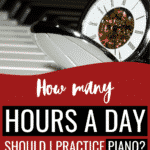As you learn to play piano, you’ve probably asked yourself “how many hours a day should I practice piano?” The reality is, you have to put in the piano practice to get the results you want. But how much is enough, and is there such a thing as too much practice?
To get the most benefit, you should aim to practice for at least 15 minutes per day. If you are a beginner, you will do best with shorter daily practice session. Advanced pianists will have the stamina to practice for up to 4 hours per day, but the time can be split up throughout the day.
How many hours you spend practicing piano depends on your skill level and whether you are a beginner, an advanced student or a professional. Your personal available time also has an impact on much time you can spend on your piano playing.
Let’s take a closer look at how you can find the right amount of practice time to suit you, your lifestyle and your ability, as well as how to practice effectively.
Post Contents
How Many Hours a Day Should I Practice Piano as a Beginner?
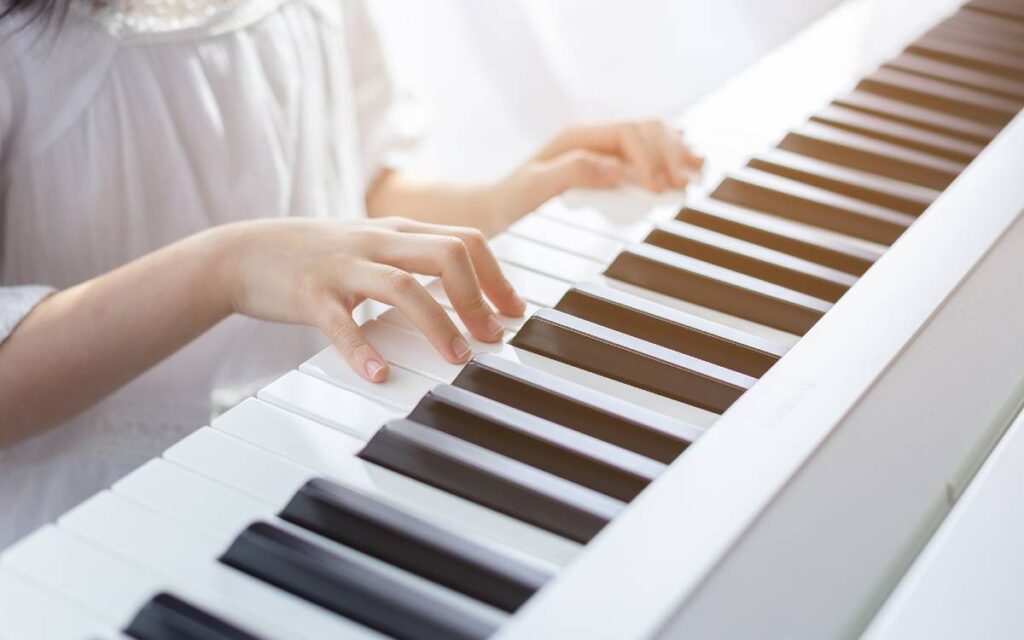
When you first start to learn the piano, a good starting point is shorter practice sessions every day.
If you are taking lessons, one of your practice sessions could be the time that you spend in your lesson. Your piano teacher can guide you and give advice on how much piano practice you should be doing each week.
Most teachers recommend that your deliberate practice time should be at least the length of the lesson.
This may not be practical for you, and how long you spend each day will be a function of other things going on in your life.
But remember, the time you spend practicing will have a direct result on how quickly you learn. Even if you have days where you can only grab a few minutes for your piano practice, this is better than nothing.
Any time that you practice piano is time well spent.
Set Realistic Practice Goals
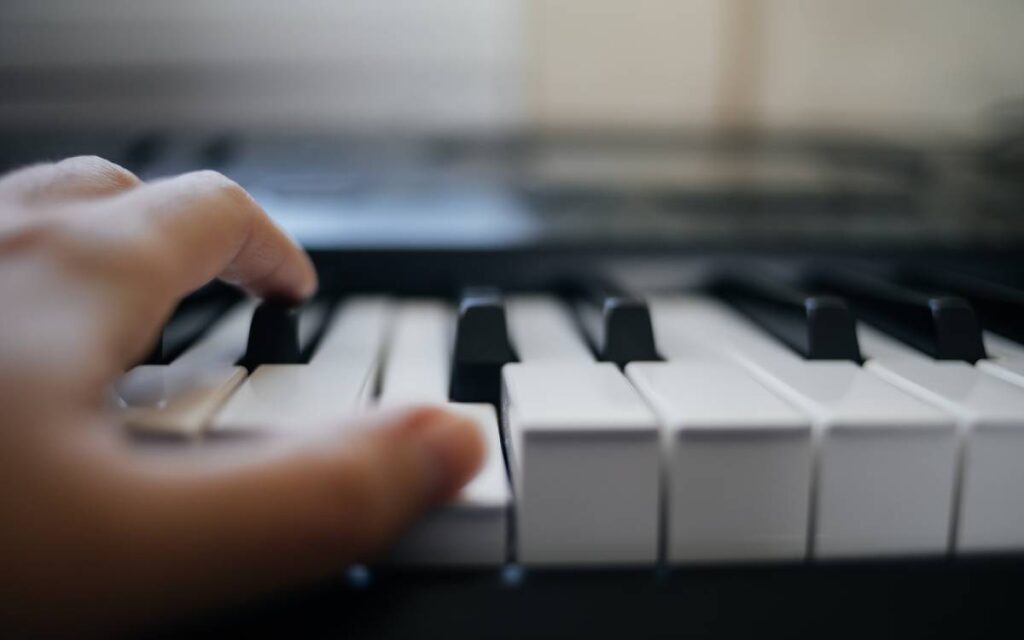
Setting realistic goals means that you are less likely to fail. The key word in that sentence is realistic.
If you have a full-time job and a busy home life, and you set a goal of 2 hours practice per day, how likely is that to happen? Trying to practice piano for two hours a day when you already have a hectic schedule is an unrealistic goal.
Be kind to yourself. If you think you can only manage 15 minutes per day, then set that as a goal to start with. But as your skill level starts to increase, you should also increase the time you spend at the piano.
Also, as you get better at the piano you will instinctively want to spend more of your time practicing.
Another good way to increase your practice goals is to spend more time on the weekend. So, you could set a goal that you will play for one hour per day on the weekend.
What Do You Want to Achieve?
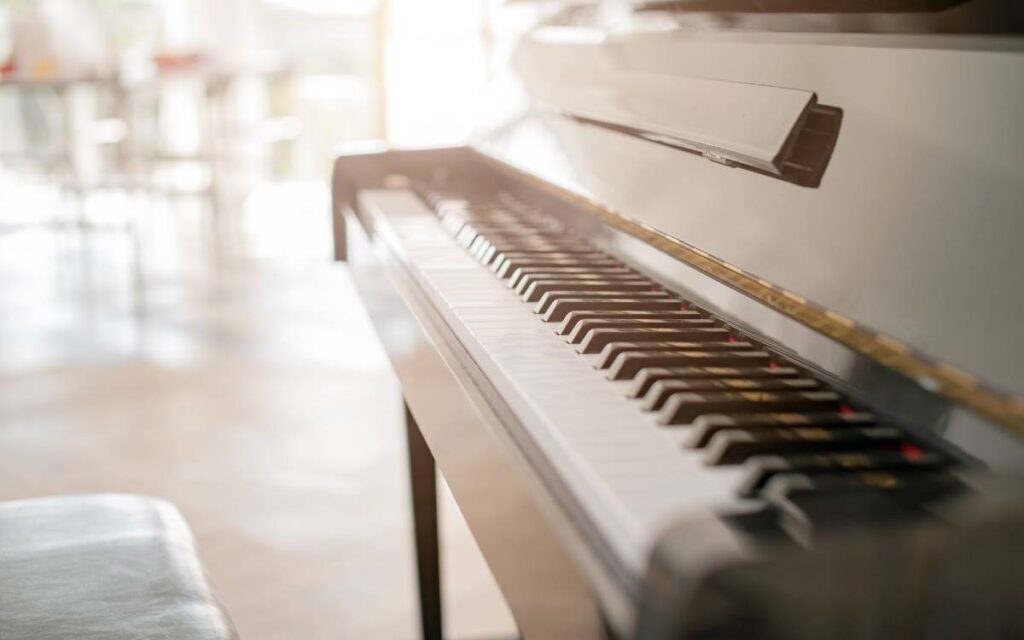
When you think about how much time to spend practicing each week, a good question to ask yourself is, “What do I want to achieve?”
Do you want to learn a new piece of music, or play in a piano recital? Setting these initial achievement goals should give you some idea of how long you should spend on your practice times.
If you are practicing for 30 minutes per day and feel like you’re not progressing fast enough, try practicing for one hour and see if that changes things. But remember to keep your practice mindful and deliberate.
Practicing is not just about learning a new piece of music. The time that you spend on technical exercises or sight reading is beneficial too. So make the first 10 – 15 minutes of your practice routine the time when you practice the technical aspects of playing piano.
What Do You Want to Practice?
Knowing exactly what you want to practice is a good place to start. For a beginner, practice might consists of learning some new techniques or going through music theory.
If you are a beginner, spend 30 minutes per day practicing your techniques before moving on to some easy beginners pieces. YouTube is a good place to find technique tutorials.
As your piano playing advances, the majority of your time may be spent on learning new pieces. But remember to spend the first 10 minutes or so of your time working on scales and other techniques to help you warm up.
For the more advanced piano player, you should be spending more than one hour per day practising your repertoire, working on your technique and learning new pieces.
Create a Practice Schedule
Practice schedules can help you to commit to your practice. Part of learning any skill, or evolving in any part of your life is when you have accountability.
You will have some accountability to your piano teacher, but it’s important to have accountability to yourself too.
Putting a practice plan into place is especially good for younger children, but it can work for adults too. You could draw up a practice plan that includes rewards for when you reach a certain level or after you learn a new piece of music.
Scheduling time to sit at the piano and setting goals prevents bad habits from creeping in. And there’s nothing to stop you from doing some mindless practice in between the more structured practice sessions.
Keeping a practice journal will also help you to keep track of how your practice is progressing. It’s interesting to look back and see some of the challenges you faced in the early days.
Be Consistent
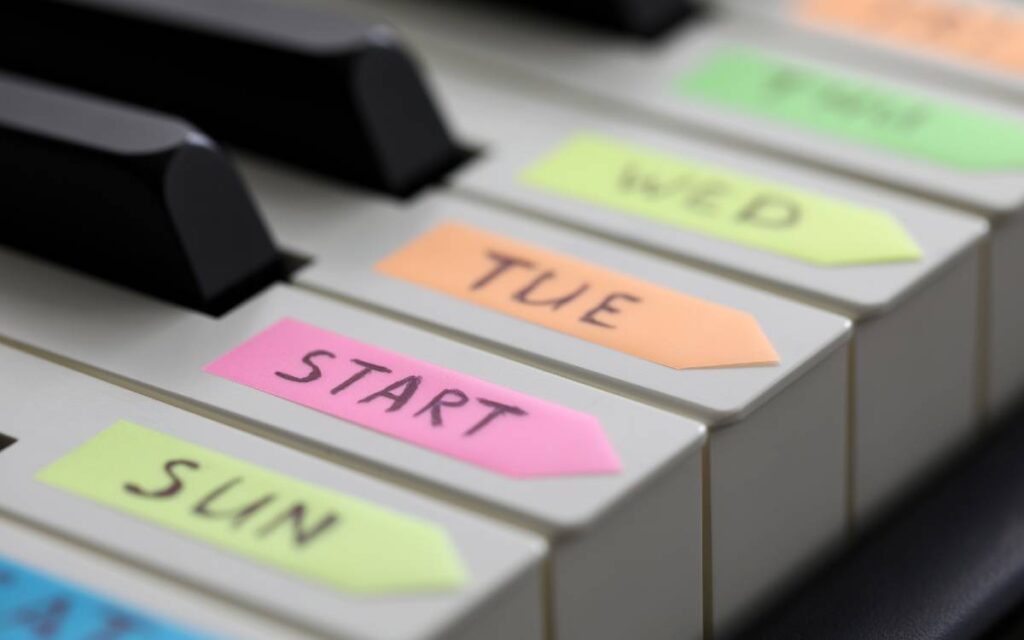
If you decide that you want to practice for 30 minutes per day, then make sure you practice for 30 minutes per day.
That sounds easy and obvious, but that daily deliberate practice means that you will progress far quicker than if you try to squeeze all of those daily 30 minute sessions into one long session each week.
Also, playing for longer periods, especially when you are a beginner, can make you tired. You want to enjoy playing the piano and not dread it, so showing up each day for shorter periods will pay off in the long run.
The key to learning the piano is effective practice. Feel free to improvise and have fun with the piano, but integrate that with daily deliberate practice and it will pay off in the long run.
Learn As You Sleep
One of the most surprising things when you learn piano, or any musical instrument for that matter, is how much your brain continues to learn while you sleep.
Have you ever struggled with a piece of music only to find that after you’ve slept, you can suddenly play it? Your brain needs that break and will continue to work on that difficult bit even while you are asleep.
That doesn’t mean that you don’t need to practice and just sleep, you obviously need to do some daily, deliberate practice.
So, a good tip is to do your practice in daily chunks of time over the week, sleep on it and continue the following day. Do this every week and you will see huge improvements in your skill level.
Making the Most of Your Piano Lessons
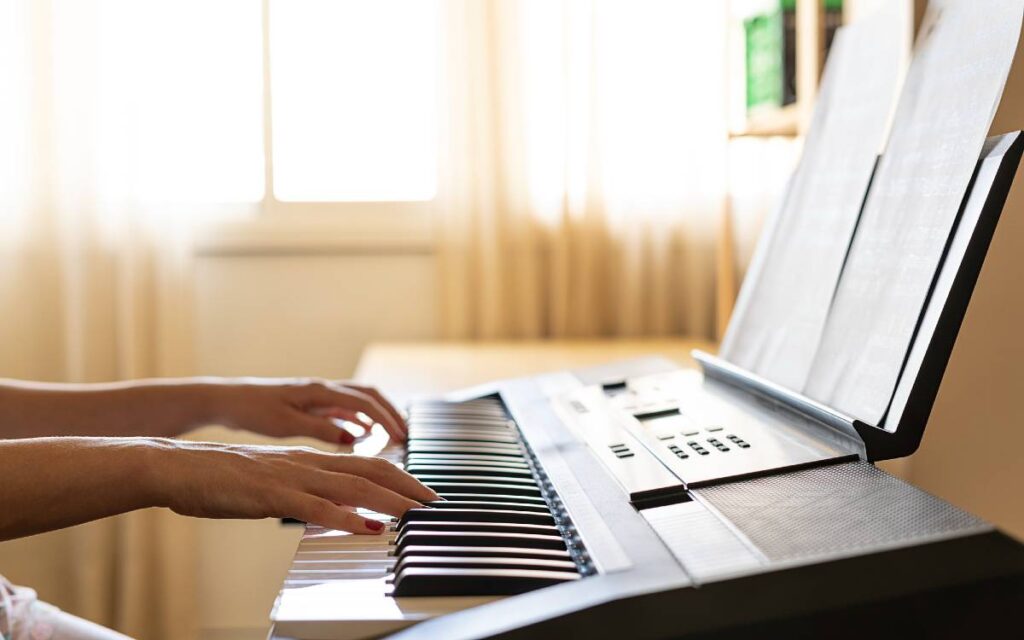
If you are taking piano lessons, the time that you spend with your teacher is when you get your feedback and advice.
A good teacher will be patient and have the skills to show you how to improve the pieces you are working on. Share your practice routine with your teacher and show them your schedule. Ask them for their advice on long term and short term goals.
As important as lessons are, the time that piano students spend at home between lesson times is when the magic happens.
When you practice piano at home use that time wisely. Take the feedback from your lesson and include it in your practice time.
Finding a good teacher is half the battle when learning to play, but it’s your practice time that will make the difference.
Quality of Practice
Make the most of the time you spend at the piano. Don’t play through your piano music pieces mindlessly without thinking about what it is you are doing.
As you work through your pieces, a good question to ask yourself is “What am I going to do better during this session?” Look carefully at what you are playing and how you are playing it. Are you including all of the dynamics? Have you got your fingering correct? Could you be using the pedal better?
Stay mindful during your practice and use it as a time to perfect your pieces and don’t just play them because you have to.
What Should My Practice Session Consist Of?
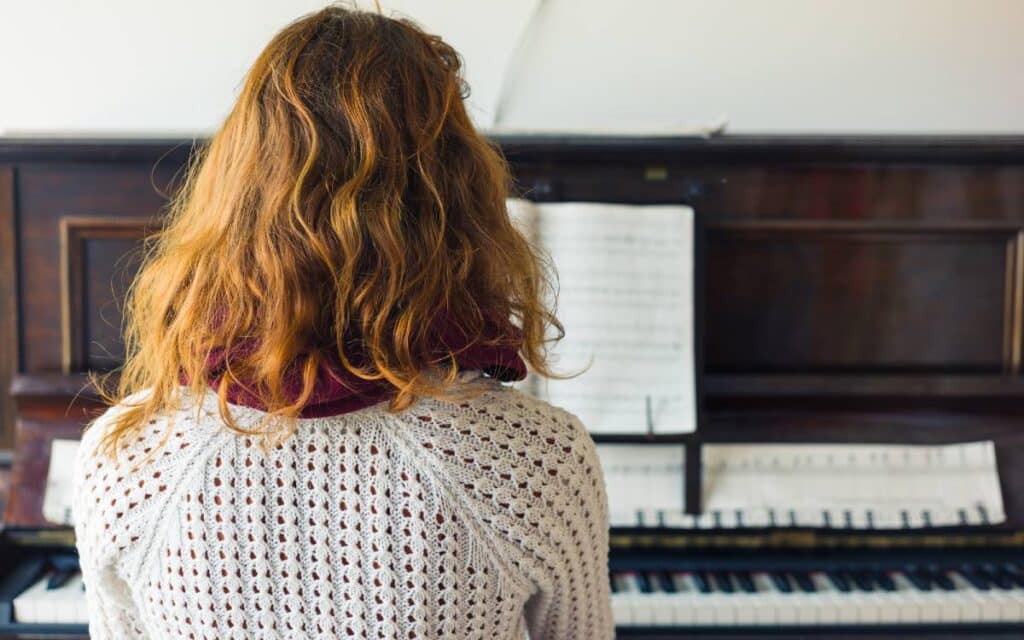
When working out your practice session, break it down into chunks of time.
Let’s assume that you have been playing the piano for a few years, by now your time practicing should be 30 – 45 minutes per day.
Spend the first 5 – 10 minutes warming up your hands by playing scales and arpeggios. Then play through something that you are familiar with.
Next, work on a piece that you are learning. Remember to do this mindfully and ask yourself what it is you want to improve. Spend 20 – 25 minutes working on this piece of music. Break it down into smaller parts and work over the harder bits.
Finally, finish your session playing music that you already know and are competent playing. Or you could end with some improvisation. The video below offers some advice how to make the most of your piano practice.
However you choose to end your practice session, make it enjoyable.
Take practice breaks
A more advanced student could spend a number of hours practicing but the structure of the practice session would be the same. If you are spending hours at the piano, remember to take regular practice breaks throughout your session.
When you are working on a piece of music, it can get frustrating if you keep getting the same bits wrong. Take time to walk away from the piano and have a break.
And when we say take a break we don’t mean a few short minutes. Take time to read a book or run errands. You could spend the time listening to the music you are learning or do something completely unrelated to piano practice.
When you come back to the piano, your mind and your body will feel refreshed.
That break allows your brain to spend time working out the problem. It’s the same as when you come back to the piano the following day after you’ve had a good night’s sleep.
Having a longer break can also be beneficial. If you take a few days off and you are away from your piano and cannot practice, when you return you’ll find that difficult piece you’ve been working on is suddenly a whole lot easier.
FAQs
How much time does a concert pianist spend practicing each day?
Most professional pianists practice for several hours a day.
Some concert pianists have eight hours of practice per day. Lang Lang spends four hours per day and you can see why when you watch his rendition of Beethoven’s Für Elise.
Can I practice too much?
Yes, it is possible to practice too much. By too much we mean how many hours you spend at the piano in any given time.
Let’s imagine you have been at the piano for three hours or more with no breaks. You can get tired, which leads to frustrations. You’ll get lazy with your technique and this is when bad habits start to creep in.
Do I have to practice every day?
Yes. Practicing every day builds good habits, and you will see your skills progress far quicker. But remember that it’s also important to take occasional breaks.
How long should a child practice piano every day?
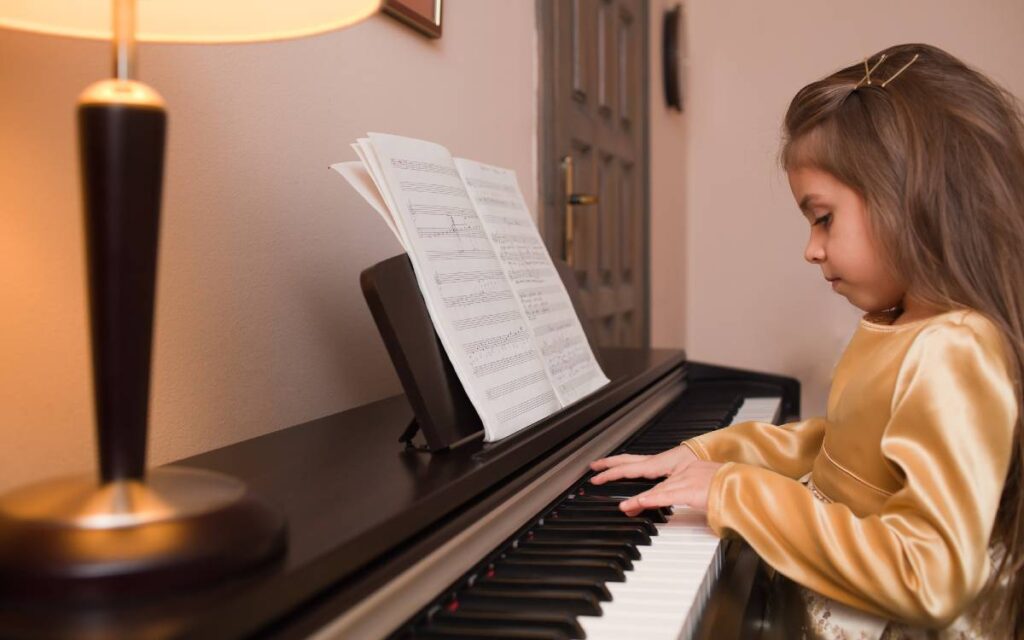
Children under the age of 5 should practice in short bursts throughout the day. Keep the practice time down to under 15 minutes.
Children between 5 – 10 can increase their practice time to 20 minutes and older children can stretch to 30 minutes or more depending on their ability.
Can I practice on a digital keyboard?
Yes. But if you are serious about learning to play the piano, make sure you invest in a good quality keyboard. Look for one that has weighted keys as this will give you the feel of playing an acoustic piano.

